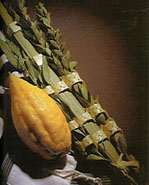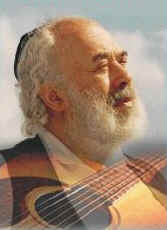Yes, folks, it's that time of year again; every few days there's a new Jewish holiday. Tonight, we begin the festival of
Sukkot.
This is the week during which we eat all our meals in a temporary booth (a "sukkah") roofed with greenery, the sort of dwelling that our ancestors used during harvest season. The very strict actually sleep in these booths every night, unless it rains.
Some years ago, in fact, a rabbi invited me to his house for lunch during this holiday and finished his meal indoors because he felt unwell. He quoted a passage from Talmud to explain: This week is called "The Time of Our Joy," and everything we do is calculated to make us happy. Therefore, if dwelling in the sukkah makes us unhappy for some good reason, we are to move indoors. Indeed, according to Talmud, if the weather is sufficiently damp to dilute our bean soup as we eat in the sukkah, that's enough reason to go in.
But what makes this the time of our joy? Several things, of course; nothing in Judaism has less than four explanations.

First of all, in ancient times, all peoples celebrated the harvest, since it showed that there would be enough food to keep the people alive for at least a year. We have faith in God to sustain us, of course, but we're not stupid.
Second of all, as we wandered in the wilderness after the Exodus and before entering the Holy Land, we lived in temporary huts, like the sukkah. God took care of all our needs during that time; the midrash goes so far as to say that for forty years no one's clothes or shoes wore out. The sukkah reminds us of that time when God cared for us directly.
Third of all, the truth is that God cares for us even today. It's less obvious because He does so by blessing the work of our own hands, and we might easily fool ourselves into thinking we don't need God to care for us anymore - that we do it ourselves. So during this week we move into flimsy huts that would go over in a good stiff breeze, to remind ourselves that God still cares for us in everything we need to live and thrive. That's good news.
Fourth of all, the greenery on top of the sukkah brings to mind the Clouds of Glory upon which we will one day ride back to the Holy Land in the time of Mashiach. The gaps in the greenery also let us see the stars at night, to remind us of our heavenly protector. That's
very good news.

So why shouldn't we be happy?

And then, during this week, we take four plants into prayer services with us: the citron, the palm, the myrtle and the willow. In Hebrew, that's the esrog, the lulav, the hadassah and the aravos. The whole construct is also called a lulav. I first learned about this tradition when I was a kid, back in the Middle Ages, and I didn't understand the rationale. In some ways, I still don't.
On the other hand, when I first went to an orthodox Sukkot service and saw all the men, each with his lulav. It looked to me like they were each holding a spear, only a very peaceful spear. It smelled wonderful, too. With my lulav adding to the feeling of togetherness and the garden smell, I felt more joined to my people than maybe at any time before.
So I still don't quite get it, but so what?
Benshlomo says, God's waiting for us in the garden.

















































